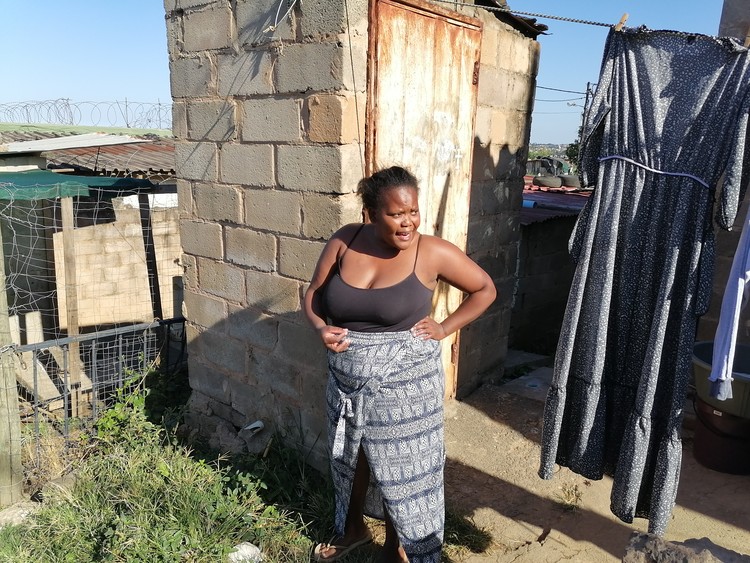“Using the bucket is better than risking your life trying to go to the neighbour’s toilet” says Durban resident
The DA in KZN is writing to the Human Rights Commission about old and overflowing pit toilets in the community
Lebo Mokoena says she would rather relieve herself in a bucket than risk her life going to a neighbour’s toilet at night. Most of the pit toilets in the community have been overflowing for years, residents say. Photo: Tsoanelo Sefoloko
- Many households in the community of Bester near KwaMashu, Durban, say they have to share toilets with neighbours because their pit toilets have been full and overflowing for years.
- The toilets were apparently built by a contractor hired by the municipality between 1996 and 1997.
- The DA in KZN is writing to the Human Rights Commission about the conditions faced by the community.
Nearly all of the pit toilets built by the eThekwini Municipality for the community of Bester near KwaMashu, Durban, more than 25 years ago, are full. Residents say some of the toilets have not been cleared in six years, forcing them to share toilets with several other households.
According to community leaders, the community was established in 1985 when the provincial government built 850 two-room RDP houses. The toilets were apparently built by a contractor hired by the municipality between 1996 and 1997.
Residents say most of these pit toilets are broken or overflowing with faeces. We were shown at least 39 toilets that were no longer used because they were full or broken.
Thobile Mtolo says she worries her toilet will soon be full because she is allowing about 18 people from eight households to use her toilet. “When I was staying alone, my toilet was always clean. But now since I help my neighbours, life is not easy, and my toilet is always smelling because it’s getting fulI. I have to clean it two times a day to prevent the smell,” she said.
Another resident, Lebo Mokoena said the toilets have been full for over six years. “The feeling of having to use our neighbour’s toilet, even at night, is not okay at all,” said Lebo. She said they first reported their sanitation problems to the municipality in 2017. “The municipality said there is a project to empty the toilets. But when the project arrived, I was passed by.”
Lebo said some nights they just relieve themselves in a bucket and throw it away the next morning. “Because crime is so high in the area, using the bucket is better than risking your life while trying to go to the neighbour’s toilet,” she said.
Community leader Bhekokwakhe Doyisa said they are now demanding the municipality formalise the area and install a proper sewerage system.
The DA’s KZN spokesperson on Human Settlements, Marlaine Nair, told GroundUp the party would be writing to the Human Rights Commission about the conditions faced by the Bester community.
“It is shocking that residents have to live in such inhumane conditions when there is budget to make their lives better. The Informal Settlement Upgrade Partnership grant was made available so that the lives of those who live in these settlements could be improved. Sadly, as at December 2022, only 41 % of the grant had been spent,” she said.
“During the budget hearing held at the Bester community hall earlier this year, community members raised the issue of pit toilets overflowing, broken toilets, and how they had to go to toilets at the mall to relieve themselves. I thought that by now officials would have attended to these issues,” said Nair.
Provincial human settlements spokesman Mbulelo Baloyi only said that the toilets were the responsibility of the City and referred all questions to them.
Head of Communication at eThekwini municipality, Lindiwe Khuzwayo, this week promised that municipal workers would be visiting the Bester community to assess the pit toilet issues.
Support independent journalism
Donate using Payfast

Don't miss out on the latest news
We respect your privacy, and promise we won't spam you.
Next: Long delays at Home Affairs mean refugees are missing out on social grants
Previous: Siyaya lawyer agrees with the defence at Judge Makhubele tribunal
© 2023 GroundUp. This article is licensed under a Creative Commons Attribution-NoDerivatives 4.0 International License.
You may republish this article, so long as you credit the authors and GroundUp, and do not change the text. Please include a link back to the original article.
We put an invisible pixel in the article so that we can count traffic to republishers. All analytics tools are solely on our servers. We do not give our logs to any third party. Logs are deleted after two weeks. We do not use any IP address identifying information except to count regional traffic. We are solely interested in counting hits, not tracking users. If you republish, please do not delete the invisible pixel.

